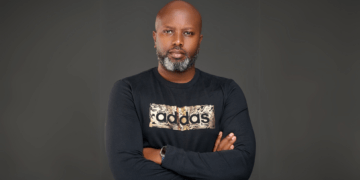Disconnect: The Wedding Planner, a sequel to the 2018 film Disconnect, has finally premiered on Netflix. The first film was among the first Kenyan movies on Netflix, creating a buzz for itself at the time, and it appears that was enough to convince Netflix to greenlight a sequel that, like me, I’m sure took many by surprise. Tosh Gitonga, the critically acclaimed director known for his magnum opus Nairobi Half Life, returns behind the camera to finish the story he began five years ago, with more than a decade of experience as a director under his belt and what appears to be a budget appropriate for such experience. Save for Nick Mutuma, who’s replaced by the bubbly and always-smiling Pascal Tokodi as the titular wedding planner and the film’s focus, the majority of the cast return to reprise their roles.
Set five years after the events of the first film, Disconnect: The Wedding Planner doesn’t feel much like a sequel. I couldn’t tell if the flashback mentions were actual events in the previous film or just occurrences that happened to the characters off-screen between the two films. Either way, the film begins by highlighting the strides the characters have taken over the years, yet keeping them almost entirely in the same archetypes as the last film. Tokodi’s character, Otis (whose pronunciation they can never get right), takes his adventurous nature to a new level, with more screen time dedicated to his promiscuous and carefree exteriorities, while Catherine Kamau takes on a more leading role as T.K, balancing flirtiness with a caring touch. Brenda Wairimu, as Celine, takes a back seat to a more supportive role as she goes through the trials of her relationship with Brian Ogola’s Richard, which was set up at the end of the first film. A mixture of old and new faces such as Patricia Kihoro, Justin Mirichii, Tanzanian Irene Paul and Nigerians Meg Otanwa, Tope Tedela, Francis Onwochei, Ozioma Jesus and Wale Ojo, to name just a fraction, make up the rest of the cast.
The synopsis of Disconnect: The Wedding Planner reads: “After falling victim to a scam, a desperate man races against the clock as he attempts to plan a luxurious destination wedding for an important investor.” But that merely acts as an excuse to parade beautiful people in beautiful places. I couldn’t help but feel like the makers of this film got their budget and decided on the places and faces they wanted for the film long before actual work on the script began. At least it feels that way, and for good reason. Director Tosh Gitonga gracefully abandons the greenery and toned-down feel of the first film’s traditional wedding for a ‘Pan-African’ step up (we’ll get to the problem later, bear with us) that makes the first feel amateurish. Calling this film beautiful is a huge understatement. Every scene is reimagined in bright colours and heavenly settings, ranging from affluent spots in the capital to lavish scenery at the Kenyan coast. And everyone is just beautiful to look at. At this point, it appears that the Disconnect franchise is approaching every actor like they’re worth their salt and offering them a good enough check, even if it’s only a passing scene.
By the end of the first film, I felt betrayed. Betrayed by a story that was shaping up one way only to lose track of itself and go for easy cop-out twists that didn’t feel earned. Disconnect 2 doesn’t make the same mistakes, choosing to simply not care for a story for the most part. Even the wedding planner himself is barely on screen, and when he is, he is, for the most part, too distracted to steer the story anywhere remotely close to his inner workings. With so many beautiful faces needing to earn their keep and so much beautiful scenery to see, something had to pay the price, and the casualty was a coherent story.
Every character has their own little conflict to deal with, but the story never lingers on them long enough, preferring to bounce off one person and quickly to the next, all in the hope that the beauty will be enough to distract the eyes. Kitchen scenes that feel out of place, important conversations that felt rushed, quarrels that were quickly brushed under the table, and a toilet scene that had me yelling “why?” at the top of my lungs – these worked occasionally, but not always. When the drama finally winds down and the chips fall into place, one can’t help but feel underwhelmed, or simply disinterested, in the final forms of the characters, so much so that they believe they can be forgiven for pairing off characters who barely talk the entire movie in the last scene for nothing more than a dramatic effect. They didn’t seem to learn from the mistakes of the first film after all.
Can we also address why a Nigerian cast (and a Tanzanian) were included in this film just for the sake of it? There’s great power in pan-Africanism and inter-country collaboration in film but not when it’s gratuitous. These characters are merely used as props, adding nothing tangible to the plot; take them out and Disconnect: The Wedding Planner still works as it was intended. And for a film whose main plot line is anchored on planning a Yoruba wedding for a rich investor, you’d expect that they’d at least put some energy into it to treat us to a memorable Yoruba wedding that will perhaps justify choosing to have such a very culturally-specific wedding outside Nigeria.
As much as I would like to go on complaining about this film, I can’t help but take a step back and realise its mere existence is a symptom of a larger problem, a problem that isn’t quite a problem. From the looks of it, Disconnect: The Wedding Planner was expensive to make. But it was an expense Netflix was willing to pay. Maybe it’s because the first film was so successful in their hidden algorithm, even though I didn’t like it, that they’re willing to risk a second and possibly more because the average Netflix viewer would rather pay to watch this than Nairobi Half Life. Maybe. Maybe this is the cost of success. Hollywood is more willing to produce a blockbuster comedy that is generally bad but makes good money than an arthouse film dissecting the human condition. Maybe it’s just a natural progression that there will always be more Disconnect films than Kati Kati films. I used to believe that Nollywood was Africa’s Hollywood, making as many films as possible in the hopes that some of them would go on to greatness and the rest would earn enough to make more while we would grow to follow the South Korean model of slow grinding artistry of quality that shapes people’s perspectives. I’m starting to accept that I was wrong. Maybe we simply didn’t have the money then, and now that Netflix and the like are here to gamble on us, maybe we are no better than Nollywood. Their music, films, actors, fashion, and lifestyle have made a home here with us, so why wouldn’t their model of doing things follow suit?
Online, some people are describing Disconnect: The Wedding Planner as a Nigerian romcom, and it might as well be. Beautiful, expansive, hollow, and quite generic. If it was Nigerian, I would simply dismiss it as a speck in a sea of similar films. But it’s Kenyan, our first mainstream sequel for one of our first Netflix movies. A flagbearer that is nothing more than a beautiful piece of forgettable fodder. To end with an actual quote from the film, “What in the Nollywood shit is this?”
Disconnect: The Wedding Planner is now streaming on Netflix.
Enjoyed this article?
To receive the latest updates from Sinema Focus directly to your inbox, subscribe now.











